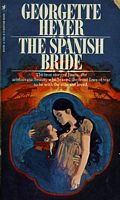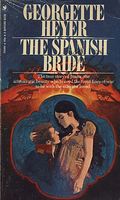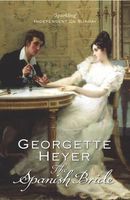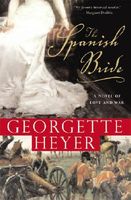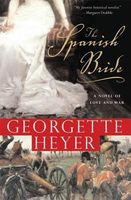- Welcome to FictionDB, Guest
- | My Account
- | Help

The Spanish Bride — Georgette Heyer
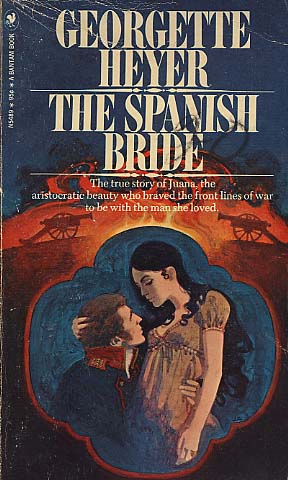
Shot-proof, fever-proof and a veteran campaigner at the age of 25, Brigade-Major Henry George Wakelyn Smith is reputed to be the luckiest man in Lord Wellington's army. Yet at the seige of Badjos in 1812, his friends foretell the ruin of his career. From the moment that 14 years old beautiful Doña Juana María de los Dolores de León looked into the eyes of Harry Smith, the dare-devil officer in the rifle-green, she knew they were made for each other.
With the same ardour he so frequently displays in battle, Henry Smith dives headlong into marriage. In his child-bride, Juana María de los Dolores de León, he finds a kindred spirit, and a temper to match. As he led her to his tent, the laughter of the wedding faded. Harry looked down at his little bride, and with all of his will mastered the desire to crush her in his arms. Had he the right to lead her into a life of the cold of an officer's tent in winter, the searing sun and horror of the summer's battles? She was alone among foreigners, barely out of the convent, bred to the sheltered life of a noble lady. What had he done? He looked into her eyes and read a girl's hero-worship there. For the first time in his reckless life, Captain Smith was afraid....
After getting married, the Spanish bride 'followed the drum,' marching at the back of the troops along with the other wives and the officers' servants. Juana became a camp favorite, charming all with her youthful enthusiasm. In spite of the danger, Juana thrived on military life and her passionate, if somewhat stormy. It was her love that took her from the battlefields of Spain to fashionable London and the agony of Waterloo.
Based on the true love story during the Peninsular Wars, when the Duke of Wellington's forces fought Napoleon's army in Spain and Portugal. Heyer's research encompassed every available diary from that time period, including Harry Smith's, and all of the Duke of Wellington's writings and dispatches. She brings alive military life during the Regency period, how the armies marched and fought, as well as how the nobility provided for its own comfort with servants, horses, dogs and furniture.
With the same ardour he so frequently displays in battle, Henry Smith dives headlong into marriage. In his child-bride, Juana María de los Dolores de León, he finds a kindred spirit, and a temper to match. As he led her to his tent, the laughter of the wedding faded. Harry looked down at his little bride, and with all of his will mastered the desire to crush her in his arms. Had he the right to lead her into a life of the cold of an officer's tent in winter, the searing sun and horror of the summer's battles? She was alone among foreigners, barely out of the convent, bred to the sheltered life of a noble lady. What had he done? He looked into her eyes and read a girl's hero-worship there. For the first time in his reckless life, Captain Smith was afraid....
After getting married, the Spanish bride 'followed the drum,' marching at the back of the troops along with the other wives and the officers' servants. Juana became a camp favorite, charming all with her youthful enthusiasm. In spite of the danger, Juana thrived on military life and her passionate, if somewhat stormy. It was her love that took her from the battlefields of Spain to fashionable London and the agony of Waterloo.
Based on the true love story during the Peninsular Wars, when the Duke of Wellington's forces fought Napoleon's army in Spain and Portugal. Heyer's research encompassed every available diary from that time period, including Harry Smith's, and all of the Duke of Wellington's writings and dispatches. She brings alive military life during the Regency period, how the armies marched and fought, as well as how the nobility provided for its own comfort with servants, horses, dogs and furniture.
Genres
Themes
People / Creatures
Click on any of the links above to see more books like this one.

